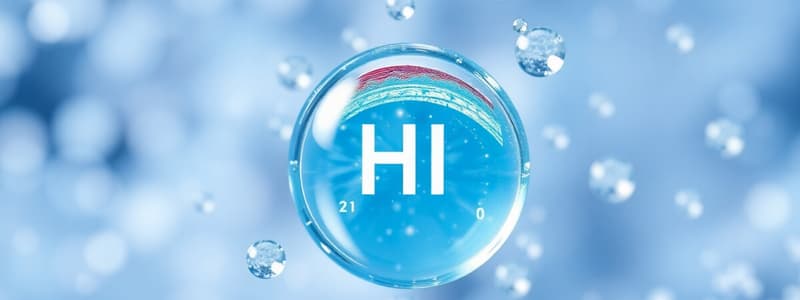Podcast
Questions and Answers
Which of these statements about hydrogen is not true?
Which of these statements about hydrogen is not true?
- Hydrogen exists as a diatomic molecule under normal conditions.
- Hydrogen is a highly reactive metal. (correct)
- Hydrogen is the lightest element.
- Hydrogen can form explosive mixtures with air.
Hydrogen is a colorless, odorless, and tasteless gas.
Hydrogen is a colorless, odorless, and tasteless gas.
True (A)
What are the three isotopes of hydrogen?
What are the three isotopes of hydrogen?
Protium, Deuterium, and Tritium.
The most abundant isotope of hydrogen is ______, which has one proton and no neutrons.
The most abundant isotope of hydrogen is ______, which has one proton and no neutrons.
Match the following applications of hydrogen with their respective uses:
Match the following applications of hydrogen with their respective uses:
Hydrogen can be produced using water electrolysis.
Hydrogen can be produced using water electrolysis.
Why is hydrogen considered a highly flammable gas?
Why is hydrogen considered a highly flammable gas?
Which of the following is a safety consideration when handling hydrogen?
Which of the following is a safety consideration when handling hydrogen?
Flashcards
Hydrogen's Properties
Hydrogen's Properties
Hydrogen is a colorless, odorless, tasteless gas, and lightest element with molar mass ~1.008 g/mol.
Diatomic Molecule
Diatomic Molecule
Hydrogen exists as a diatomic molecule (H2) under normal conditions.
Hydrogen Reactivity
Hydrogen Reactivity
Hydrogen readily forms covalent bonds and can gain or lose an electron, becoming H+ or H-.
Protium
Protium
Signup and view all the flashcards
Deuterium
Deuterium
Signup and view all the flashcards
Tritium
Tritium
Signup and view all the flashcards
Hydrogen Sources
Hydrogen Sources
Signup and view all the flashcards
Safety with Hydrogen
Safety with Hydrogen
Signup and view all the flashcards
Study Notes
Physical Properties
- Hydrogen is a colorless, odorless, tasteless gas at standard temperature and pressure.
- It is the lightest element, with a molar mass of approximately 1.008 g/mol.
- Hydrogen exists as a diatomic molecule (H2) under normal conditions.
- It is highly flammable and reacts explosively with oxygen.
- Hydrogen has a low boiling point (-252.87 °C) and a low melting point (-259.14 °C).
- It exists in three isotopic forms: protium (1H), deuterium (2H or D), and tritium (3H or T). Protium is the most abundant.
Chemical Properties
- Hydrogen has a single electron and a single proton and is the simplest element.
- Hydrogen readily forms covalent bonds in its reactions and has a tendency to gain or lose an electron to become a positive (H+) or negative (H-) ion.
- Hydrogen can react with many metals, non-metals, and also other compounds to form various products.
- The element's reactivity varies based on the reaction conditions and the specific substances it interacts with. Hydrogen reacts more readily with oxygen compared to nitrogen.
- The hydrogen molecule (H2) is unusually strong. This stability is due to the strong covalent bond that holds the two hydrogen atoms together.
Isotopes
- Protium (1H) has one proton and no neutrons, it is the most common isotope of hydrogen.
- Deuterium (2H), also known as heavy hydrogen, has one proton and one neutron.
- Tritium (3H) has one proton and two neutrons. It is radioactive and has a relatively short half-life.
Sources of Hydrogen
- Natural gas and other fossil fuels are often used to produce hydrogen in industrial applications.
- Water electrolysis is a method of producing hydrogen from water using electricity.
- Biological processes can also produce hydrogen, though this is less common in large-scale production.
Applications of Hydrogen
- Hydrogen is used as a fuel in fuel cells, which produce electricity through a chemical reaction with oxygen.
- In some industrial processes, hydrogen is used as a source of energy for the creation of ammonia.
- Hydrogen is essential in the manufacturing of some key chemicals, including fertilizers.
Safety Considerations
- Hydrogen is highly flammable and can form explosive mixtures with air.
- Proper storage and handling procedures are crucial for preventing accidents.
- Igniting hydrogen by any means may cause explosions.
- Precautions should be in place for any workplace where hydrogen is handled. This includes well-ventilated areas to ensure adequate safety from exposure.
Future Potential
- Hydrogen is considered a potential alternative fuel for transportation and other applications as it produces water as a byproduct.
- Research is ongoing to improve the efficiency and safety of hydrogen production, storage, and transportation.
Studying That Suits You
Use AI to generate personalized quizzes and flashcards to suit your learning preferences.




